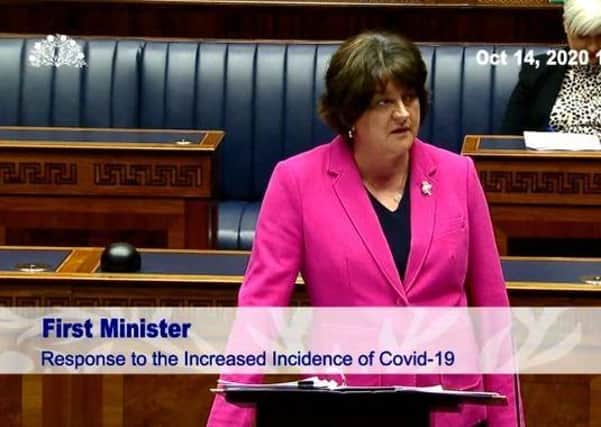Sam McBride: NI Executive in a weaker position to deliver a more complicated form of limited lockdown


To highlight these problems is not to suggest that there are simple options which could have been taken. Throughout the pandemic it has increasingly become clear that every option open to the Executive will involve pain, or even an increase in deaths, and even the ablest politician would only be able to seek out the least worst option.
But given the significance of these restrictions on human freedoms and the importance that they succeed in suppressing coronavirus, it is right to analyse their likely efficacy.
Advertisement
Hide AdAdvertisement
Hide AdThe first problem is that a move towards far tougher controls on business and movement relates to an implicit acceptance that the Executive’s last strategy did not work.
There is a paucity of clear data as to the precise reasons for the surge in cases in certain parts of Northern Ireland and the tracing system does not appear to be operating as intended. But it is clear that cases have been surging upwards for weeks.
The fact that the last strategy did not work in containing the virus may be because it was a bad strategy. Yet there is also significant anecdotal evidence that the limited restrictions brought in by the Executive over recent weeks were being flouted – and simply were not being properly enforced.
If the reason that the last law did not work was that it could not be enforced, why would the new law be any more successful unless the public either voluntarily comply with it or there is robust enforcement of those who do not do so?
Advertisement
Hide AdAdvertisement
Hide AdThe second problem is the complexity of the new message from Stormont – in part due to having five parties representing multiple political ideologies and constitutional positions.
Some of the Executive parties privately concede that the package contains significant mixed messages. Although the Executive is advising against “unnecessary travel”, that conflicts with other aspects of the new rules.
Keeping retail open means that someone can still make a non-essential journey to buy a handbag or new curtains, while being told that they cannot walk to their local cafe or take their children to school.
Whatever the merits of a full lockdown, it was a simple message and it was therefore easier to enforce. By not returning to that scenario, the rules are necessarily more complex and harder to enforce, not least because many of the public will legitimately be able to say that they do not fully understand rules so complex that even the First Minister in the Assembly was vague in answering some specific questions about what will be permitted.
Advertisement
Hide AdAdvertisement
Hide AdBut politicians - and society as a whole - now realise more fully the enormous health damage (let alone the economic damage, which was always appreciated) which lockdown caused, even if it was then the lesser of two evils.
They are therefore deeply reluctant to go back to that situation, even though the message would be far simpler and enforcement would be more straightforward.
There is also a specific weakness in these new restrictions. The Executive is reimposing a limit of 25 mourners at funerals. Yet Michelle O’Neill, the deputy First Minister who is telling the public that they must take this difficult step, continues to defend her decision to openly break the restrictions on funerals by attending IRA commander Bobby Storey’s huge funeral involving thousands of mourners.
Ms O’Neill has never accepted that she broke her own rules, much less apologised for doing so (rather, she expressed regret at the controversy around the issue, implying that was the fault of those criticising her).
Advertisement
Hide AdAdvertisement
Hide AdHer moral leadership has been shattered not just by breaking the public health guidance, but by her continued refusal to accept that she did so and her insistence that “I will never apologise for attending the funeral of my friend” – even though she is now telling many of the public not to attend their friends’ funerals.
This Executive had enormous public support and goodwill when it instituted lockdown in March. It is now in a far weaker position to deliver a far more complicated and contradictory policy.
——— ———
A message from the Editor:
Thank you for reading this story on our website. While I have your attention, I also have an important request to make of you.
With the coronavirus lockdown having a major impact on many of our advertisers — and consequently the revenue we receive — we are more reliant than ever on you taking out a digital subscription.
Advertisement
Hide AdAdvertisement
Hide AdSubscribe to newsletter.co.uk and enjoy unlimited access to the best Northern Ireland and UK news and information online and on our app. With a digital subscription, you can read more than 5 articles, see fewer ads, enjoy faster load times, and get access to exclusive newsletters and content. Visit https://www.newsletter.co.uk/subscriptions now to sign up.
Our journalism costs money and we rely on advertising, print and digital revenues to help to support them. By supporting us, we are able to support you in providing trusted, fact-checked content for this website.
Alistair Bushe
Editor